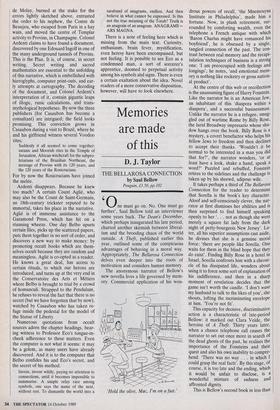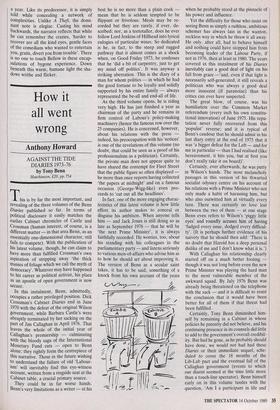Memories are made of this
D. J. Taylor THE BELLAROSA CONNECTION by Saul Bellow
Penguin, £3.50, pp.102
one must go on. No. One must go further', Saul Bellow told an interviewer some years back. The Deam's December, which perhaps inaugurated his late period, charted another skirmish between liberal- ism and the brooding chaos of the world outside. A Theft, published earlier this year, outlined some of the conspicuous advantages of behaving in a moral way. Appropriately, The Bellarosa Connection delves even deeper into the roots of motivation and considers human memory.
The anonymous narrator of Bellow's new novella lives a life governed by mem- ory. Commercial application of his won- `Hold the olive, Mac, I'm on a fast.' .drous powers of recall, 'the Mnemosyne institute in Philadelphia', made him a fortune. Now, in plush retirement, sur- rounded by comforting wealth, even the telephone a French antique with which `Baron Charlus might have romanced his boyfriend', he is obsessed by a single, tangled connection of the past. The con- trast between real memory and the recapi- tulation techniques of business is a strong one: 'I am preoccupied with feelings and longings', he notes, 'and emotional mem- ory is nothing like rocketry or gross nation- al product'.
At the centre of this web or recollection is the unassuming figure of Harry Fonstein. Like the narrator he is an American Jew, an inhabitant of this `diaspora within a diaspora', and a successful businessman. Unlike the narrator he is a refugee, smug- gled out of wartime Rome by Billy Rose, the lurid Broadway impresario whose sha- dow hangs over the book. Billy Rose is a mystery, a covert benefactor who helps his fellow Jews to freedom and then declines to accept their thanks. 'Wouldn't it be normal to be interested in a man you did that for?', the narrator wonders, 'or at least have a look, shake a hand, speak a word?' Puzzled and rebuffed, Fonstein retires to the sidelines and the challenge is taken up by his shrewd, adipose wife.
It takes perhaps a third of The Bellarosa Connection for the reader to determine that Sorella is the book's key character. Aloof and self-consciously clever, the nar- rator at first dismisses her abilities and is then surprised to find himself speaking openly to her . . not as though she were merely a square fat lady from the dark night of petty-bourgeois New Jersey'. La- ter, all his superior assumptions cast aside, he divines that she is a genuine moral force: 'there are people like Sorella. One waits for them in the blind hope that they do exist'. Finding Billy Rose in a hotel in Israel, Sorella confronts him with a chroni- cle of his dissipated life, wonders about using it to force some sort of explanation of his indifference, and then in a sharp moment of revelation decides that the game isn't worth the candle. 'I don't want my husband to talk to the likes of you', she shouts, lofting the incriminating envelope at him. 'You're not fit'.
This capacity for decisive, discriminative action is a characteristic of late-period Bellow: it marked out Clara Velde, the heroine of A Theft. Thirty years later, when a chance telephone call causes the narrator to set out once more in search of the dead ghosts of the past, he realises the importance of the Fonsteins and their quest and also his own inability to compre- hend. 'There was no way . , in which I could grasp the real facts'. By this stage, of course, it is too late and the ending, which it would be unfair to disclose, is a wonderful mixture of sadness and affronted dignity.
This is Bellow's second book in less than a year. Like its predecessor, it is simply told while concealing a network of complexities. Unlike A Theft, the domi- nant note is elegiac. Casting his mind backwards, the narrator reflects that while he can remember the crazies, 'harder to recover are all the kind eyes, gentle faces of the comedians who wanted to entertain you, gratis, divert you from trouble'. There is no one to touch Bellow in these encap- sulations of bygone experience. Down beneath this warm, humane light the sha- dows writhe and flicker.



























































 Previous page
Previous page